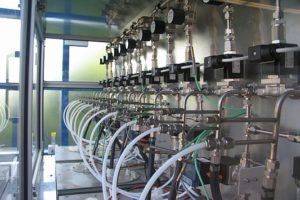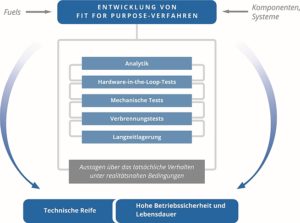Research and Development
Our core competence: Test procedures for future fuels

OWI develops hardware-in-the-loop test benches for testing the interaction of fuels with components in the fuel supply line for automotive or combustion appliances. Photo: OWI
Renewable liquid fuels make an indispensable contribution to a secure and economical energy supply in the mobility and heat sectors. In the near future, their contribution to climate protection will increase significantly. Therefore, intensive research is being conducted into the production of renewable liquid fuels which have a high impact on the reduction of greenhouse gas emissions.
OWI’s application-oriented research investigates how liquid fuels interact with components in the fuel supply line under realistic operating conditions. This ensures that developers do not experience any surprises during market launches. Whoever enters the market with a new fuel, component or system needs maximum operational reliability even during field or fleet test.
“Fit for Purpose” test procedures for high operational reliability and service life time
Classical testing looks at either fuels or components, but it neglects the complex interplay of fuels and technologies/systems, whose compatibility is straightforward. That is why OWI develops application-oriented “Fit for Purpose” test procedures that simulate real-life operating conditions in the laboratory. This includes:
- Investigation of cause-effect relationships of fuels interacting with technical components;
- Development of methods, test procedures and test benches for fuels and technical components (identification of deposit formation, material wear, etc.);
- Combustion and long-term storage tests.

OWI develops application-oriented “Fit for Purpose” test procedures that simulate real-life operating conditions in the laboratory. Illustration: OWI
This results in valid statements about the actual behavior of fuels, additives, components and entire systems under application-related conditions which, for example, disclose fuel and material-related risks. The findings from the application of the test methods provide an important basis for product development decisions.
